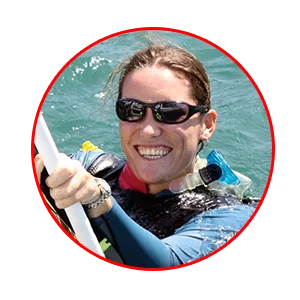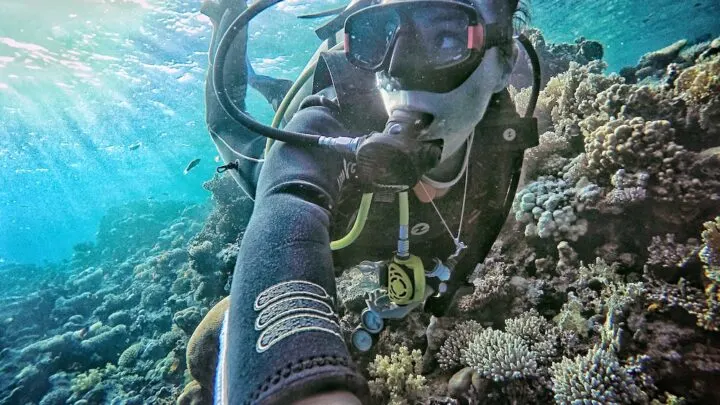On a poll in the Girls that Scuba Facebook group about training that people found beneficial, self reliant diving was incredibly popular. So we thought we’d dig deeper and find out more about what exactly self reliant diving is?
What is the self reliant diver course?
“Self reliant diver” is a PADI certified program which has become more and more popular over the past few years. Many other agencies also run a self reliant program and it can also appear under other guises. The course may also be called “Solo Diver”. It is not the encouragement to go diving alone by any means. It is purely the idea that you are prepared to deal with the majority of possible emergencies by yourself.
The self reliant course trains you to be pretty much “ready for anything” and self prepared.
Diving Risks
Scuba diving, along with any adventure sport has an element of risk. We, as humans are not designed to breathe underwater. As such, we have to rely on our equipment and skills to ensure that we return to the surface safely.
Scuba diving as a whole is not dangerous with DAN reporting 1 fatality out of every 212,000 dives in 2010. Doesn’t seem much I know, and when put in perspective against other adventure activities (1 in 116,666 fatalities when skydiving) or even non-adventure activities like driving a car statistically diving is safer. This is just to give you a general perspective on scuba diving.
Now, of those fatalities, and in general, any accidents when diving, the main cause is diver error. No matter how comfortable you are with anything in life, it is all too easy to become complacent. That is when you make mistakes. Running the same checks and routine every time you go diving can seem easy, which is when you can forget.
As a scuba diving professional there is an additional pressure on you, whether you are guiding certified divers or teaching students. You need to mentally and physically prepare yourself and then go through the same again for your class or clients.
So why are we mentioning this? Complacency when preparing is what can lead to accidents, whether when preparing your class or clients or yourself. And then, once you are out there diving you have to watch out for everybody. A client or student has a problem, they have their buddy to turn to and then you as their additional back up brain.
One of the first things that is taught in the course is how valuable and important it is to dive with a buddy. But what if you have a problem as a leader? Who is your back up? This is when the principal of self reliant diving comes into play.
So what does the self reliant course actually involve?
After looking at the values and importance of diving with a buddy, one of the first principles that is looked at is the philosophy or diving without a partner. Mental preparedness is key. Are you ready to go self reliant diving? Are you ready to be able to deal with any emergencies independent of anyone else? Have you thought about the consequences of diving by yourself if you choose? Did you methodically prep and check your equipment? Have you formulated a dive plan and will subsequently stick to it? Have you informed others of your dive plans? These all need to be covered before you even get to actual diving.
The second principal is redundancy which very much falls under onto your equipment preparedness. When diving as a self reliant diver you are pretty much ready to deal with any emergency. So what back ups do you need? Think everything you can, from mask, and timing device, depth gauge to a separate air source.
Back-Up Air Source
A back up air source in this case is a completely separate tank and regulator. When training for this type of scuba diving you have a few options. This could mean diving with a twinset, sidemount or with a pony tank and deco reg. You carry the pony bottle on your BCD. In case of an emergency you have a completely separate air source to breathe from.
Computer
In case of a computer fail, you have a back up computer (ideally) or if not a watch and separate depth gauge to ascend safely. If you have a problem with your mask, you have a back up. By having all of these additional fail safe systems in place it adds an additional level of safety to your diving.
Dive Planning
Dive planning and gas management is the next step in the self reliant course. One of the skills you cover when completing a self reliant dive course is that you will calculate your Surface air consumption rate (SAC). This is how much air you breath at the surface from any given tank. It can then be used to calculate your air for any dive using any size scuba tank or dive depth.
The reasoning behind this, is so that you can make a more accurate plan when you set out to go scuba diving. By knowing your average air consumption when scuba diving you can ensure that you take plenty of air with you including a reserve for your planned dive.
So why take self reliant training?
As a dive professional I feel personally that it is even more important to have this training, because how many times are you leading a group of divers, that if something should arise, will come swimming to assist? If you teach a lot of discover scuba divers or open water divers then not many I would think.
When you are guiding or teaching you have to be self sufficient, so that you can look after any of your own problems without needing to reach out to your students who may not be able to calmly deal with something as they are focusing on their training. For any student that I train to a professional level I include self reliant training and its principals as there is no such thing as being over prepared when diving.
So, you may be reading this and thinking, well, I am just a recreational diver and why would this benefit me? Ask your self this, are you always diving with someone you know really well? Have you ever been buddied up with a new person? If that’s the case then absolutely you should look at getting self reliant trained. By having this mentality when you dive of being doubly prepared and more self sufficient, you will be able to enjoy your dives so much more and explore the world.

About the Author
Georgia King, a Course Director, originally from England, has been teaching for 13 years. She runs all professional and technical training courses at Oceans Unlimited a CDC center on the central pacific coast and is currently helping them expand their marine conservation education center and marine awareness programs along with her own company Go Pro Costa Rica. When not bubbling under the waves she can be found hiking the local rainforest with her crazy pooch.

